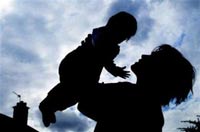|
|

|
|
Mothers can pass along their experiences to their children without even trying, researchers reported in a surprising study on Tuesday that showed baby mice could inherit the benefits of "education" that their mothers received before they became pregnant.
|
Mothers can pass along their experiences to their children without even trying, researchers reported in a surprising study on Tuesday that showed baby mice could inherit the benefits of "education" that their mothers received before they became pregnant.
The study shows that inheritance can go far beyond the classic genetic theories, researchers report in The Journal of Neuroscience.
They found that young mice raised in an enriched environment -- with toys and other stimulation -- passed along the learning benefits to pups they had after they grew up.
The stimulated mothers did not simply have better parenting skills, because the researchers showed pups swapped at birth still learned better if their biological mothers - but not their foster parents - had been raised with the extra toys.
"You inherit to some degree some aspects of your parent's experience," Larry Feig, a professor of biochemistry at Tufts University School of Medicine in Boston, said in a telephone interview.
"This is a protective mechanism a mother passes on to her offspring," Feig, who helped lead the study, added.
Feig and colleagues raised mice, some in plain cases with wood chips and others in "enriched" cages with boxes, a running wheel, toys, and constant rearrangements of nesting material.
They tested learning with an unpleasant "shock chamber" to condition the mice to be afraid.
Mice born to mothers raised in the "enriched" cages learned much more quickly that the shock chamber was a scary place, Feig's team found. This was true even when the mothers did not become pregnant until weeks after they lived in the special cages.
點(diǎn)擊查看更多雙語新聞
(Agencies)
|
研究人員于本周二報(bào)告稱,母親的經(jīng)驗(yàn)不用刻意傳授就可“自動(dòng)”傳給下一代。該項(xiàng)令人驚訝的研究發(fā)現(xiàn),幼鼠能夠繼承母鼠在懷孕前所受“教育”的益處。
研究人員在發(fā)表于《神經(jīng)系統(tǒng)科學(xué)》期刊的研究報(bào)告中稱,研究顯示,遺傳可大大超出傳統(tǒng)基因理論的范圍。
研究人員發(fā)現(xiàn),在放有玩具和其它刺激物的“高級”環(huán)境中成長的幼鼠會(huì)將它們的認(rèn)知經(jīng)驗(yàn)傳給下一代。
這些在高級環(huán)境中受過“熏陶”的母鼠并非更懂得育兒技巧,因?yàn)檠芯咳藛T發(fā)現(xiàn),即便幼鼠在出生時(shí)被調(diào)換,但只要它們的生母(而非養(yǎng)母)曾在放有特別玩具的環(huán)境中長大,那么它們的認(rèn)知能力也會(huì)更強(qiáng)。
波士頓圖弗茲大學(xué)醫(yī)學(xué)院的生物化學(xué)教授拉里?菲格在接受電話采訪時(shí)說:“人在一定程度上能夠遺傳父母的某些經(jīng)驗(yàn)。”
協(xié)助負(fù)責(zé)開展該研究的菲格教授說:“這是母親傳給下一代的一種保護(hù)機(jī)制。”
菲格及其同事分別在裝有木屑的普通盒子和放有盒子、飛輪和玩具等物品的“高級”籠子中培育兩組幼鼠。在后一個(gè)環(huán)境中,研究人員還不停地變換物品的擺放。
之后,研究人員分別檢測兩組老鼠的“學(xué)習(xí)能力”,他們將老鼠放在一個(gè)不太舒服的“震動(dòng)箱”中讓它們感到害怕。
研究小組發(fā)現(xiàn),在高級籠子中培育的母鼠所生的幼鼠能更快地認(rèn)識到震動(dòng)箱是一個(gè)令人害怕的地方。即便母鼠在離開這種特殊的籠子數(shù)周后才懷孕,效果也一樣。
(英語點(diǎn)津姍姍編輯)
|